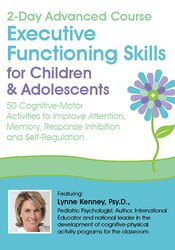

In this recording, Lynne Kenney, Psy.D., pediatric psychologist, author and international educator, will show you how to integrate the newest research in neuroscience, kinesiology, and neurocognitive education for students to behave better and learn more efficiently.
You will experience 50 developmentally progressive cognitive-exercises and coaching activities to enliven your classroom, office and clinic.
Learn how to improve cognition, enhance learning and empower children to be better thinkers with motor movement, sequencing, attending, self-regulation, and memory activities.
This online program is worth 11.25 hours CPD.
| File type | File name | Number of pages | |
|---|---|---|---|
| Manual - Executive Functioning Skills for Children & Adolescents (14.42 MB) | 130 Pages | Available after Purchase |

Dr. Lynne Kenney is the nation’s leading pediatric psychologist in the development of classroom cognitive-physical activity programs for students grades K-8. She develops curriculum, programming, and activities to improve children’s cognition through coordinative cognitive-motor movement, executive function skill building strategies, and social-emotional learning. Her current educational program is CogniMoves®, a classroom cognitive-motor movement program, co-developed with Benjamin S. Bunney, MD, Former Chairman Department of Psychiatry at Yale University. CogniMoves® is designed to strengthen executive function skills in K-3 students.
Dr. Kenney is a pediatric psychologist on the language & cognition team at Wellington-Alexander Center for the Treatment of Dyslexia, Scottsdale, Arizona. She has advanced fellowship training in forensic psychology and developmental pediatric psychology from Massachusetts General Hospital/Harvard Medical School and Harbor-UCLA/UCLA Medical School. As an international educator, researcher, and author, she is dedicated to improving the trajectory of children’s learning, particularly in high-need, under-resourced communities. Dr. Kenney’s books include Brain Primers, 2020 (Kuczala & Kenney); 70 Play Activities for Better thinking, Self-Regulation, Learning and Behavior (Kenney & Comizio, 2016); the Social-Emotional Literacy program, Bloom Your Room™; Musical Thinking™, and Bloom: 50 Things To Say, Think and Do with Anxious, Angry and Over-the-Top Kids (Kenney & Young, 2015). Her most recent endeavor is Cognitivities™, an original collection of portable mats that combine music, art, and movement developed with Fit and Fun Playscapes. Launched in 2024, this is the first Roll-Out Activities® mat of its kind, helping children with cognitive skills, executive function, and self-regulation in a calming and engaging way. In development, FlowMoves™ cognitive-motor movement cards for high-need communities and families to support co-regulation and self-regulation.
Since 1985, Dr. Kenney has worked as an educator in community services with national organizations including the Neurological Health Foundation, Head Start, Understood.org, HandsOn Phoenix, SparkPE, the First Nations in Canada, and Points of Light (Generation On). Dr. Kenney values working with Title I Schools.
Speaker Disclosures:
Financial: Dr. Lynne Kenney is the creator of CogniSuite & The Kinetic Classroom and the co-creator of 5n45. She is the co-owner of Move2Learn, LLC and has an employment relationship with Wellington-Alexander Center for the Treatment of Dyslexia. Dr. Kenney receives a speaking honorarium and recording royalties from PESI, Inc. She has no relevant financial relationships with ineligible organizations.
Non-financial: Dr. Lynne Kenney has no relevant non-financial relationship to disclose.
Priming the Brain for Learning
Foundational Motor Competencies that Proceed Learning
Musical Thinking
Thinking Interventions for Better Learning and Behavior
“I am the Best Coach for My Brain” - Lessons for Students
The “Cognitive Conversation” about Attention
Seated Work For Better Attention
Cognitive Engagement - Music, Piano & Drumming
Developing Your Own Patterns and Sequences
Language, Dyslexia, Reading and Learning
Visual-Motor Language: Spotlight
Brain Primers (Mike Kuczala)
The “Cognitive Conversation” about Memory
Improving Behavior with Cognitive-Motor Movement
The “Cognitive Conversation” about SelfControl (Response Inhibition) + Impulsivity
Self-Regulation: Heavy Work
Self-Regulation: Achieving an Alert State of Calm
Attention, Memory and Inhibition
Rhythm Ball for Calming
| 5 |
|
| 4 |
|
| 3 |
|
| 2 |
|
| 1 |
|
Satisfaction Guarantee
Your satisfaction is our goal and our guarantee. Concerns should be addressed to info@pesi.co.uk or call 01235847393.
Please wait ...